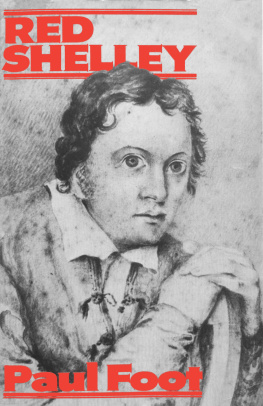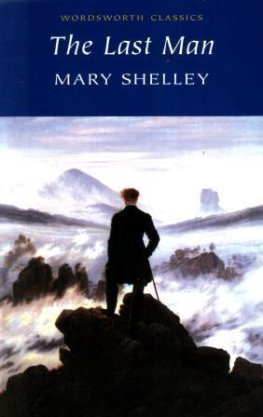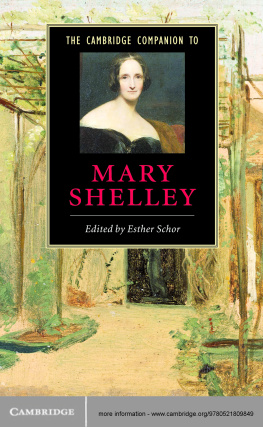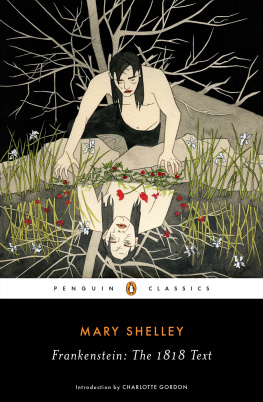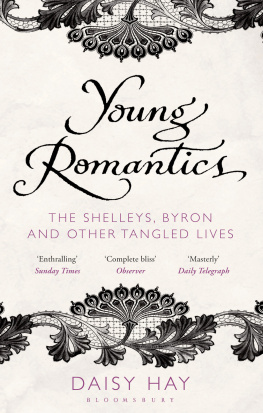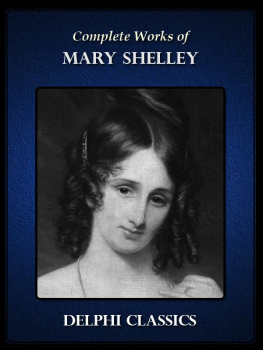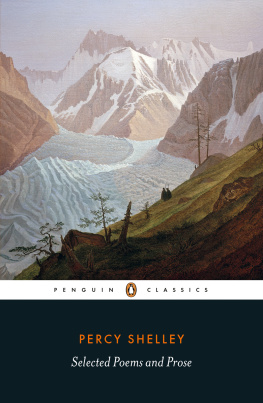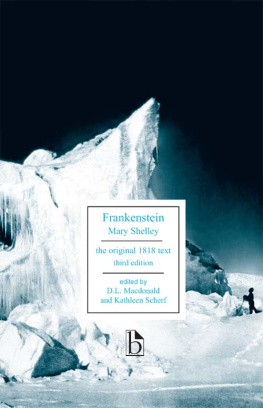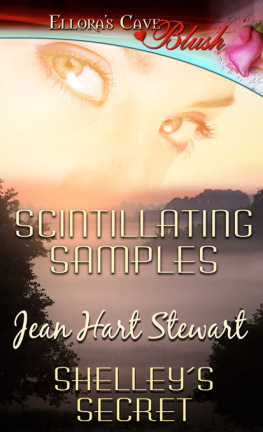Red Shelley
PAUL FOOT

SIDGWICK & JACKSON
LONDON
in association with Michael Dempsey Publications
While Percy Bysshe Shelley was alive he was universally despised by all who did not know him. His poetry was rarely published; his prose almost wholly censored. Posterity served him even more harshly than did his contemporaries. He was patronised by Matthew Arnolds description of him as an ineffectual angel.
Today, too often, Shelley still appears as that angel, beating his wings in vain.# he is celebrated as a great lyric poet without any practical ideas or value.
Paul Foot shows in this book that this censorship and patronising were induced by Shelleys political radicalism which inspired almost all his writing. He traces Shelleys ideas through his republicanism, his atheism, his feminism and his egalitarianism. He identifies the sources of these ideas and follows their course forward into the radical feminist and working class movements which grew to maturity after Shelleys death.
Shelleys convictions rose and fell with the popular movements of his time from the Luddite uprisings to Peterloo, but for all the wavering, there is no doubting the poets revolutionary inspiration and commitment.
This exhaustive study is invaluable in placing Shelleys writings in their political context which, as Paul Foot demonstrates, is essential for a proper understanding and appreciation of his work.
INTRODUCTION
Shelley suddenly gripped me, I dont think as a poet, abut as a visionary about life. No one who has not felt Shelley once like that can know, I think, what Shelley is. I still recover those first feelings when I turn to him
Goldsworthy Lowes Dickinson in a letter to E. M. Forster
I share with Shelley a rotten education at University College, Oxford.
On many journeys to the colleges football changing rooms, I passed, with only a moments hesitation, a huge gilded cage, under a dome. Inside. On a marble slab borne up by angels and sea lions, as though from the deep, was, and still is, the statue of a beautiful young man, emphatically naked. A typewritten note stuck rather shamefacedly on the wall told me that this was Percy Bysshe Shelley, who had been an alumnus of University College, Oxford, from 1810 to 1811. I remember asking the dean of the college why Shelley had spent so little time at the university. Oh, muttered the dean, embarrassed, he was drowned. And so, of course, he was eleven years after he had been expelled from University College for writing the first atheist pamphlet ever published in English.
The naked Shelley was the subject of much sport each summer I was at Oxford. As a climax to what is known as Eights Week, the future leaders of the nation would mourn yet another disaster for the University College First Eight by squeezing between the bars of Shelleys cage, and wreaking havoc on his statue. Weve got Shelleys balls! was the plummy cry of triumph which would echo through the quadrangles at three or four in the morning.
The authorities shrugged their shoulders and sought out a mason who replaced the missing parts.
The castration of Shelley at British places of learning has not been confined to rowing oafs. Ladies and gentlemen of letters have been at it far longer, and with far greater effect. I still have a slim navy blue volume, entitled Shelley , She sets to her scissors with a will, extracting with devoted thoroughness every trace of political or social thought form Shelleys work.
In the beautiful Nonesuch edition of Shelley: Selected Poetry, Prose and Letters , published in 1951, the editor, a well-read gentleman called A. S. B. Glover, rejoices as he leaves out two of Shelleys greatest longer poems, both political from start to finish. Peter Bell and Oedipus [ Swellfoot the Tyrant ], writes Mr Glover, are mainly of interest as proof that a great lyric poet may fail lamentably outside his own proper field
Similarly, Kathleen Raine in her selection of Shelley in the Penguin Poet to Poet series, writes: Without regret, I have omitted Laon and Cythna (later revised and renamed The Revolt of Islam ), and a great deal of occasional political verse by Shelley the student activist in which the inspirers had no hand.
These are just a few examples from my own literary upbringing and education. The are repeated over and over again in perhaps a hundred castrated editions of Shelley over the last 150 years.
The castration is horrible. The treatment of Shelleys Philosophical View of Reform, for instance, is almost incredible. It was written at the height of Shelleys literary powers. It ranks in style and in content with the most famous radical pamphlets of our history with Tom Paines Rights of Man , with Mary Wollstonecrafts Vindication of the Rights of Women , with the pamphlets of Bentham or Robert Owen or Marx and Engels. It was available and known to all the people who had access to Shelleys notebooks after his death. Yet it stayed there, not even transcribed, for one hundred years after it was written. And even then in 1920 it was published only as a collectors item for members of the Shelley society.
Shelleys most explicit work on sex and love, A Discourse on the Manners of the Ancient Greeks, Relative to the Subject of Love , was held back even longer. It first appeared in an edition edited by Roger Ingpen in 1931, 113 years after it was written, and even then it was privately printed.
By this process of censorship and omission, Shelley has been sheltered from young people at school and university even more carefully than have most other radical or revolutionary writers. He is regarded as too complicated for study by O level classes. And, to judge from the questions asked about him at A level, he is very complicated indeed! The questions are almost exclusively about Shelleys linguistic or lyrical qualities. In 1967, for instance, students for the A level English literature paper set by the Joint Matriculation Board (Liverpool. Sheffield. Leeds, Manchester, and Birmingham Universities) were asked to study Prometheus Unbound . The question put to them after all their study was: What are the outstanding poetic qualities of the songs and lyrics in Prometheus Unbound ?
In all the English literature papers set by the three main examination boards the Joint Matriculation Board, Oxford, and Cambridge from 1961 to 1977, there is only one question, from Oxford in 1974 How does Shelley handle the theme of liberty? which concedes that Shelley had any political ideas at all.
The most time-honoured rule for teaching anything at our schools and universities is that people should stick to what Mr. A. S. B. Glover calls their proper field. Science is science, law is law, literature is literature and politics is politics. Each must be isolated. The separation is enforced with special fervour for poetry and politics. For poetry can inspire people. And it is extremely important for the fabric of society that inspirations should be kept away from politics, and especially from anything which smells of subversion. So poetry is judged as poetry, by standards set down by experts on poetry. Politics, students are reminded sharply, has nothing to do with it.
It is all humbug. George Orwell, who could sniff out humbug quicker than most, wrote shortly before he died:
The more I see the more I doubt whether people ever really make aesthetic judgements at all. Everything I s judged on political grounds which are then given an aesthetic disguise. When for instance, Eliot cant see anything good in Shelley or anything bad in Kipling, the real underlying reasons must be that one is a radical and the other a conservative, of sorts. Yet evidently one does have aesthetic reactions, especially as a lot of art and even literature is politically neutral, and also certain unmistakable standards do exist, e.g. Homer is better than Edgar Wallace. Perhaps the way we should put it is: the more one is aware of political bias the more one can be independent of it, & the more one claims to be impartial the more one is biassed.
Next page
